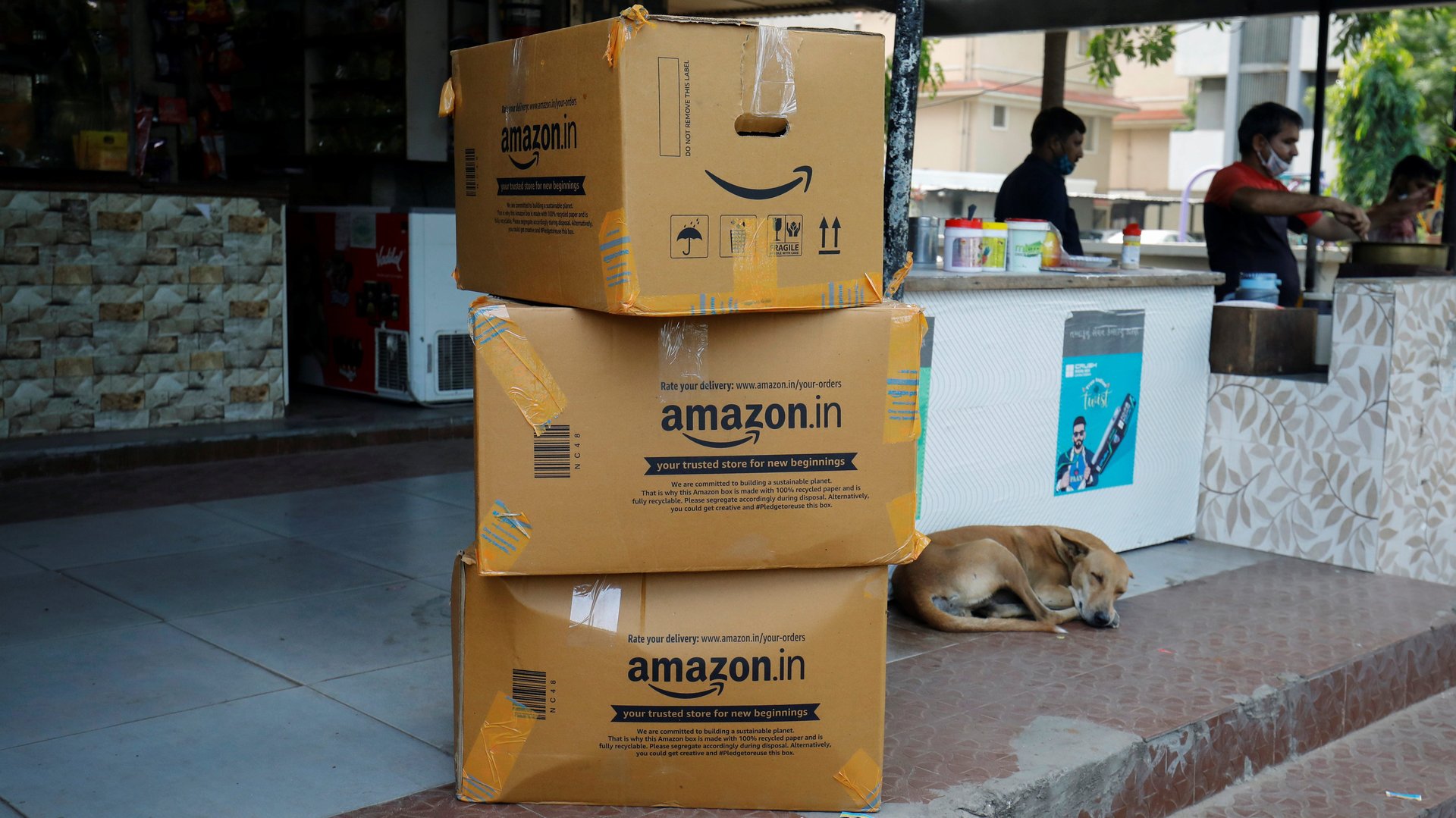The two ways in which the Amazon-Reliance tug of war over Future Group can end
Amazon is getting another shot at stopping Reliance Industries (RIL) from scooping up Future Group.


Amazon is getting another shot at stopping Reliance Industries (RIL) from scooping up Future Group.
The Indian supreme court will tomorrow (Feb. 8) hear the US e-commerce giant’s petition against a halt on a case in the Singapore International Arbitration Centre (SIAC) against Future Retail’s asset sale to the Mukesh Ambani-led RIL.
The proceedings were scheduled for between Jan. 5 and 8. On Jan. 5, the Delhi high court stayed it, citing a December 2021 order from the competition commission of India (CCI). The order had suspended a 2019 deal between Amazon and Future Coupons, a Future Retail promoter company.
“Amazon’s objective is to block the sale of Future’s warehouses and stores to Reliance Retail and if it succeeds at the supreme court, it shall be a step closer to entrenching itself in the world’s biggest open consumer market and prevent Reliance’s from cementing its dominant position,” Salman Waris, managing partner at law firm TechLegis, told Quartz.
A recap of the Amazon-Future Group-Reliance tussle
2019: Amazon acquires a 49% stake in Future Coupons for around 1,500 crore rupees ($201 million). Future Coupons holds a 9.82% stake in Future Retail, indirectly giving Amazon a 4.81% stake in the latter.
2020: In August, Future Group strikes a Rs24,713 crore ($3.3 billion) deal with RIL, India’s largest company, helmed by the country’s richest man. In October, Amazon secures an emergency order from SIAC to halt the deal. Future Group denies any wrongdoing and marches on. The next month, it moves the Delhi high court against Amazon’s interference. Over the next two months, the RIL-Future Group deal gets the nod from CCI…
2021: …as well as the Securities and Exchanges Board of India (SEBI). Over the year, the Singapore tribunal’s decision is blocked and unblocked in the country’s courts. In October, the supreme court upholds the SIAC emergency order.
Meanwhile, in June, CCI accuses the Seattle-based Amazon of concealing facts and making false submissions when it bought a stake in Future Coupons in 2019. In December, in an unprecedented move, the antitrust body suspends the over two-year-old deal and slaps Rs202 crore as a penalty on Amazon. (Future’s stocks surged 20% on this news.)
Scenario #1: Amazon wins tomorrow
For Amazon, the arbitration proceedings getting green-lit means there’s a chance the merger stops in its tracks. Consequently, it could stop an already massive competitor—RIL—from getting even bigger.
Debt-laden Future Group, though, is looking at liquidation if the RIL deal falls through. Among other things, its 30,000 employees could lose their jobs. Amazon is willing to “sink the ship” but doesn’t want RIL to acquire Future’s assets, Future Group’s lawyer Harish Salve said earlier.
The e-commerce behemoth did offer to bail it out—albeit at less than a third of RIL’s offer—but Future Group’s independent directors rejected it.
Scenario #2: Amazon loses tomorrow
Amazon’s loss is Future Group and RIL’s best-case scenario.
Future Group, which has been racking up losses and defaulting on obligations, will get a shot at survival.
For RIL, the extra business could give it a pole position in India’s $1 trillion retail market. Reliance Retail already boasts of more than 12,000 stores and annual revenues upwards of Rs1.6 lakh crore ($21.4 billion). Future Group’s retail business includes 1,800 stores of grocery chains and fashion outlets. Plus, the deal includes Future Group’s wholesale, logistics, and warehouse businesses.
What about Amazon’s CCI case and 2019 Future coupons deal?
On Feb. 14, the National Company Law Appellate Tribunal (NCLAT) will hear Amazon’s appeal against the CCI order keeping its approval for the deal with Future group in abeyance. If the NCLAT favours Amazon, the RIL-Future Group deal isn’t cancelled, but Amazon has a chance to keep fighting.
“The NCLAT is mainly an appeal against CCI decision so that may have a strategic impact but it cannot block the deal and it will not impact supreme court ruling,” said Waris.
If the NCLAT ruling doesn’t go in Amazon’s favour, and it does retrospectively lose the 2019 deal, then it’ll have little say in the matter.